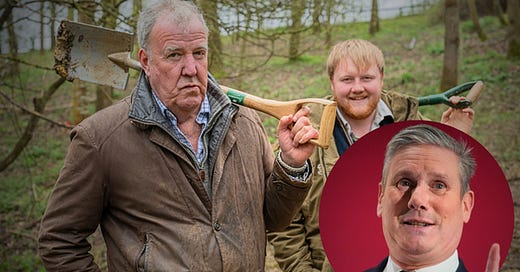For decades the British agricultural sector, like those in numerous other Western nations, has come under sustained attack by the government in Westminster. When Britain joined the European Union’s Common Market in 1973 the regulatory environment of Brussels immediately began to squeeze the agricultural producers of this country.
Many people forget, but at one point Cumbria was turned into a massive killing field for British livestock because this nation had turned over its agricultural health regulations to Brussels. Many farms were forced out of business, and British farmers suffered immensely.
Before this country joined the European Union more than 1,890 local abattoirs (slaughterhouses) operated across this country, but stringent regulations in Brussels steadily forced the locations to close because they could not keep up with the unreasonable regulatory burdens. Today just 249 abattoirs remain in this country, many of them gargantuan in scale and staffed immigrant workers rather than Britons working in their local communities. The British state has made no effort to reverse the EU regulations left ‘on the books’ here in this country, and abattoirs continue to close at a pace of roughly 10% each year.
Britain’s farmers have been crying out for aid, relief, and assistance for decades only to be met by a cold shoulder from our own government. Brussels (before Brexit) and both political parties, and now Keir Starmer’s Labour administration is launching a new taxation based attack upon this country’s dwindling agricultural sector.
The Labour government plans to impose a 20% inheritance tax on all agricultural assets above £1 million in value, with the hope that the the government will be able to generate £520 million each year in additional tax revenue by 2029.
While the government claims that the ‘vast majority’ of farms will not be affected by this tax the National Farmers’ Union has told the government that any significant tax increase will be disastrous for Britain’s family farms and will steadily force families off the land as patriarchs die and inheritance tax comes due.
Inclined though I am to trust the wise administration of Keir Starmer, I took it upon myself to do a bit of back of the napkin maths. The average farm in Britain is roughly 200 acres (81 hectares) in size, with the average value of an acre of agricultural land in Britain currently worth £11,300/acre at the moment. Given this, the average land value of a British farm (not counting the cottage, the livestock, the equipment, the outbuildings) is worth roughly £2.26 million. Though, government reports indicate that half of British farms are just 50 acres in size (or roughly 50 acres). Still, these smaller farms will still be worth £565,000 pounds just in land value.
This author, just like Reform Party leader Nigel Farage, fails to see how the government can possibly claim that the average British farmer will not see a 20% inheritance tax placed upon their assets when simple maths proves that a massive share of British farms will fall above the £1 million threshold and therefore have to pay the tax or sell their ancestral lands to do it.
This is more than just a betrayal of British farmers, though. The British public have demanded for years that our government invest in domestic agriculture so that food on British plates is grown by British farmers and processed by British workers—a fundamentally nationalist position, I might add.
The National Farmers’ Union reports that some 91% of Britons believe that farming is important to the British economy while 85% of Britons want to see food self-sufficiency in this country increased so that we are no longer dependent on foreign imports for our basic sustenance. At the moment the British agricultural sector, decimated by years of EU and Westminster attack, produces only 54% of the food the British eat and employs just 1% of our domestic workforce. Yet, the British public want to eat food grown in these isles and harvested by British hands.
Indeed, our own government published a report in May of 2024 that Britain is almost perilously over-reliant upon imports of fruit and vegetables and that we must begin to produce these products on British farms, though the elected political class has clearly decided that less farming will, somehow, be better for the national dinner table.
And finally there is the fundamental anti-Britishness of attacking the farmer class in this country. Former Top Gear star Jeremy Clarkson, who now has a reality show (set on his own Cotswolds farm) called Clarkson’s Farm, has accused Starmer of “ethnically cleansing” the British countryside: Clarkson accuses Labour of 'ethnically cleansing' countryside with Budget 'making farming nigh on impossible', LBC, November 9, 2024.
Some 97.2% of agricultural workers in this country (not counting seasonal workers) are of native British extraction, making this industry one of the last British supermajority industries in the domestic economy.

But, just as is true in the United States, this industry is under sustained attacks by the advocates of multiculturalism and mass immigration. The British media revel in the chance to lambast native Britons for their supposed refusal to work on British farms, all while forgetting to mention that farm workers lack protections many other sectors of the economy enjoy.
Instead of working with the British agricultural sector to expand the number of family farms and British seasonal workers (rather than foreign workers) the British government has opted to continue to attack the sector in every way it can imagine, forcing yet more native Britons off their own land in their own country.
Support our mission to take on more writers and contributors:
Zelle: whitepapersinstitute@protonmail.com
Buy us a coffee: https://www.buymeacoffee.com/wppi
Linktree: https://linktr.ee/wppi
Snail Mail: White Papers Policy, PO Box 192, Hancock, MD 21750








